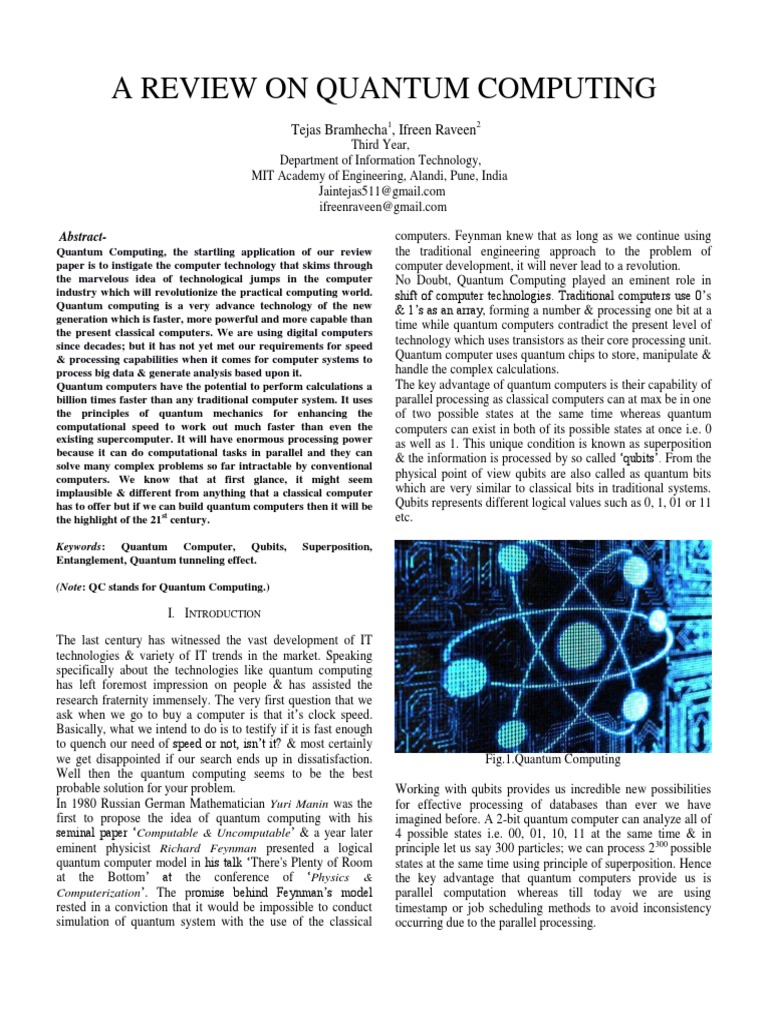Are relativistic effects relevant in quantum computing? At first glance, such a question may appear speculative, a whimsical jab that blurs the boundary between two monumental realms of physics. Nevertheless, the intersection of quantum mechanics and relativity beckons profound exploration, promising both theoretical insight and practical implications in the burgeoning field of quantum information science. This essay endeavors to scrutinize whether relativistic phenomena, typically relegated to high-energy physics, bear any significance in the intricate and delicate architecture of quantum computation.
To embark on this inquiry, it is paramount to delineate the fundamental tenets of both quantum mechanics and relativity. Quantum mechanics, with its probabilistic nature, describes a world where phenomena such as superposition and entanglement govern behavior at microscopic scales. Conversely, Einstein’s theory of relativity offers a nuanced understanding of the cosmos at macroscopic scales, where the fabric of space-time itself becomes malleable in the presence of mass and energy. The esoteric nature of these frameworks lays the groundwork for examining their potential interplay.
One pivotal question arises: when does the influence of relativity become non-negligible in quantum systems? The answer often orbits around velocities approaching the speed of light or energies on the order of the rest mass energies of particles. Classical quantum mechanics might triumph in scenarios devoid of significant relativistic impact. However, as computational architectures venture into regimes where particles approach relativistic speeds, one may need to reconsider conventional assumptions of particle behavior. Quantum computing typically relies on manipulating qubits—fundamental units of quantum information—formed by systems such as electrons or photons. For systems operating at high energies or under strong gravitational forces, relativistic corrections may not merely serve as an academic nicety but rather emerge as a necessity.
Moreover, the advent of quantum field theory introduces a paradigm where particles are treated as excitations within fields, showcasing a more pronounced relativistic character. The synthesis of quantum mechanics with special relativity results in a framework where quantum state propagation must account for the finite speed of light and the cause-and-effect principle inherent to relativistic physics. Entangled states, while fundamentally a quantum construct, can exhibit perplexing implications when viewed from a relativistic perspective, leading to inquiries regarding the locality of information transfer. Does the instantaneous nature of quantum entanglement challenge the causal structures dictated by relativity? Such considerations evoke fascinating thought experiments, engaging both theorists and quantum engineers alike.
As we pivot from theoretical constructs to practical applications, the challenge of incorporating relativistic effects into quantum computer design becomes apparent. Modern quantum computing platforms, such as ion traps and superconducting qubits, have primarily operated under the assumption of non-relativistic frameworks. Still, with the increasing ambition to establish larger, more capable quantum systems, there lies an imperative to investigate the ramifications of relativistic corrections on qubit coherence and computational fidelity.
Consider, for instance, quantum communication protocols. Quantum key distribution (QKD) exploits the principles of quantum mechanics for secure communication. However, when one entertains the notion of implementing QKD across vast distances—where particles might traverse significant portions of curved space-time—one must revisit the applicability of relativistic effects. Does the curvature of space-time introduced by massive objects pose a threat to the integrity of quantum states during transmission? The answer may reside in a synthesis of quantum optics and relativistic physics, fostering a deeper understanding of how information can be reliably carried across the cosmos.
Furthermore, advancements in quantum computing necessitate exploring the integration of relativistic quantum effects in algorithms and protocols. Quantum simulation, a pillar of quantum computing, seeks to replicate complex quantum systems within a computational framework. If those systems inherently exhibit relativistic phenomena, ignoring such considerations could lead to inaccurate simulations, thwarting a pivotal goal of quantum computation: to transcend the limitations of classical modeling.
The exigency for incorporating a relativistic framework into quantum systems can also be drawn from the exploration of topological quantum computing. This cutting-edge paradigm relies on non-local properties of quantum states to protect information against noise and decoherence. These non-local properties might emerge from interactions that embed relativistic effects, suggesting that relativistic phenomena could potentially enrich the landscape of topological qubits, rendering them more robust against various error mechanisms.
Yet, as we contemplate the implications of relativistic effects within quantum computing, we must confront an essential quandary: the fidelity of our computational systems vis-à-vis theS rigors of relativistic physics. Does the ephemeral nature of quantum states entrepreneurially collide with the deterministic model of relativistic space-time? Herein lies a philosophical crossroads that beckons both scientists and mathematicians alike to forge new theoretical pathways. One cannot help but ponder whether this dichotomy may lead to novel insights, potentially revolutionizing our understanding of computational domains.
In conclusion, the inquiry into the relevance of relativistic effects in quantum computing transcends mere academic curiosity. It posits a myriad of challenges that, if confronted, could decisively reshape the trajectory of quantum information science. From altering the architecture of qubits to enriching communication protocols, the interplay between relativistic phenomena and quantum mechanics invites an intricate dance of theory and experimentation. While some may argue that these effects are relegated to the high-energy frontier, the accelerating advancement of quantum technologies compels us to reconsider our paradigms and to expect the unexpected at the confluence of these two venerable realms of physics.












